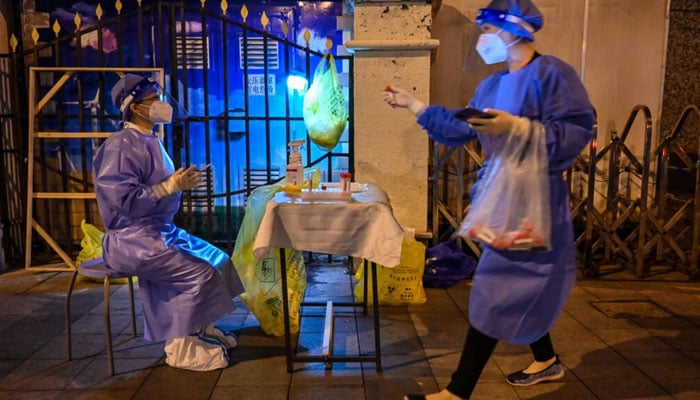China doubles down on zero-COVID after reopening rumours boosted markets
China is the last major economy wedded to a strategy of extinguishing outbreaks as they emerge
BEIJING: China said on Saturday that it would "unswervingly" stick to its zero-COVID policy, dampening the outlook for global markets following their recent surge on hopes that Beijing would cast aside some of its economically damaging virus curbs.
China is the last major economy wedded to a strategy of extinguishing outbreaks as they emerge, imposing snap lockdowns, mass testing and lengthy quarantines despite the widespread disruption to businesses and international supply chains.
Stock markets climbed on Friday in part on unsubstantiated rumours that Beijing was poised to announce significant changes to the policy or even lay out a path towards a full reopening.
But authorities poured cold water on the speculation, with National Health Commission (NHC) spokesperson Mi Feng confirming on Saturday that Beijing would "stick unswervingly to... the overall policy of dynamic zero-COVID".
"At present, China is still facing the dual threat of imported infections and the spread of domestic outbreaks", Mi said at a press briefing.
"The disease control situation is as grim and complex as ever," he said. "We must continue to put people and lives first."
China recorded 3,659 new infections on Saturday, the majority of which were asymptomatic, according to the NHC.
The thousands of domestic cases logged in the past week represent a tiny fraction of the country's vast population, but have been enough for officials to take drastic action — sometimes with unpopular or tragic consequences.
A lockdown of the world's biggest iPhone factory in the central city of Zhengzhou prompted large numbers of workers to flee on foot, alleging food shortages, inadequate medical care and poor treatment from their employer, Taiwanese tech giant Foxconn.
On Thursday, authorities in the northwestern city of Lanzhou made a rare apology after a three-year-old boy died of carbon monoxide poisoning following his denial of medical treatment during a weeks-long Covid lockdown.
Officials on Saturday criticised the use of "excessively layered" and "one-size-fits-all" policies in some locales but insisted the overall zero-tolerance virus approach was "correct".
Reopening rumours
Chinese stocks jumped on Friday in part on rumours that China might loosen the policies, which include a ten-day quarantine for inbound travellers and a "circuit-breaker" on Covid-affected international passenger flights.
The Hang Seng Index closed up more than 5%, while bourses in Shanghai and Shenzhen rose 2.4% and 3.2% respectively.
But a reopening still appears to be a long way off, with areas contributing over 10% of China's overall gross domestic product under some form of enhanced virus curbs as of Thursday, according to a calculation by Nomura.
The Japanese bank also warned that the impact of any policy easing "would likely be very limited" and said it foresaw a "very small probability to materially ending (zero-COVID) before March 2023".
China's year-on-year economic growth rebounded to 3.9% in the third quarter of this year, but analysts still expect Beijing to miss its stated goal of around 5.5% annual GDP growth by a wide margin.
President Xi Jinping, who has made fighting the pandemic a cornerstone of the ruling Communist Party's legitimacy, lauded zero-COVID's "significant positive results" at a congress last month as he sealed a precedent-busting third term in power.
-
Bitwise Crypto Industry innovators ETF: What investors should do in 2026?
-
Nintendo shares slide again as momentum fears grow
-
Gold, silver prices fallen sharply; What’s driving the drop?
-
Gold’s record climb: Experts question if its safety is ‘overstated’
-
Dubai unveils plans to construct street built with real gold
-
Netflix slams Paramount’s bid: 'Doesn't pass sniff test’ as Warner battle escalates
-
Ubisoft: Shares plunge amid restructuring plan and wave of games cancellations
-
Netflix revises Warner Bros. deal to $83 billion: All-cash offer












